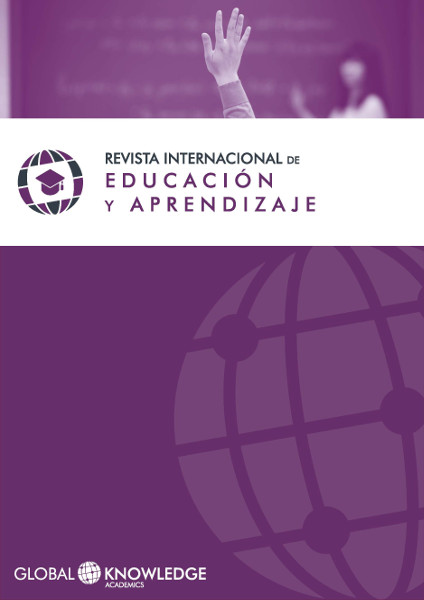Learning Organizations as a Key Factor to Improve the Quality of Education: A Descriptive-Correlational Study on Schools of Excellence in Quality of Education in Santiago, Metropolitan Region, Chile
DOI:
https://doi.org/10.37467/gka-revedu.v3.589Keywords:
Learning Organizations, Learning Schools, Organizational Learning, Quality of Education, Educational ImprovementAbstract
The following study conducted between 2010 and 2011 whose main objective is to study the relationship of each of the five disciplines raised by Peter Senge in schools with high academic achievement sustained over time and with a quality management system of the Metropolitan Region, Santiago, Chile, for this we have chosen a descriptive-correlational design. Initially, to select the intervened schools, it was considered their good quality of education as well as a high quality educational management; subsequently the relevant instruments were designed for the collection of data and their analysis. Once having made a careful analysis and correlation of these results allowed us to endorse that schools with excellence in the quality of education within its organizational structure evidential relationship exists between each of the disciplines of Peter Senge, which allows us to confirm the influence of the theory of learning organizations with the improvement of school management processes.
Downloads
Global Statistics ℹ️
|
1108
Views
|
2578
Downloads
|
|
3686
Total
|
|
References
Argyris, C., y Schon, D. (1994). On organizational learning. Organization Studies-Berlin-European Group For Organizational Studies-, 15, 460-460. DOI: https://doi.org/10.1177/017084069401500309
Bisquerra, R. (2004). Metodología de la investigación educativa . Madrid: La Muralla.
Bolivar, A. (2000). Los centros educativos como organizaciones que aprenden: Una mirada crítica. Revista Digital de Educación y Nuevas Tecnologías, 18 (III). Contexto Educativo.
Bolivar, A. (2002). Cómo mejorar los centros educativos . Madrid: Síntesis S.A.
Bolivar, A. (2007). Los centros educativos como organizaciones que aprenden. Promesas y realidad. Madrid: La Muralla.
Castañeda, D., y Fernández, M. (2007). Validación de una escala de niveles y condiciones de aprendizaje organizacional. Universitas Psychologicas, 6 (2), 245-254. DOI: https://doi.org/10.1037/t73771-000
Drucker, P. (2007). The practice of management . Burlington: Butterworth-Heinemann (B-H).
Gairín, J. (1999). La organización escolar: Contexto y texto de actuación . Madrid: Muralla.
Gairín, J. (2001). Cambio de cultura y organizaciones que aprenden. Revista de Pedagogía, 420, 31-85.
Gairín. J., y Darder, P. (1994). Organización y gestión de centros educativos . Barcelona: Praxis.
Gore, E., y Dunlap, D. (2006). Aprendizaje y organización . Buenos Aires: Granica.
Hargreaves, A. (1998). Paradoja del cambio: La renovación de la escuela en la era postmoderna. Kikiriki. Corporación educativa, 49, 16 – 24.
Hernández, R., Fernández, C., y Baptista, P. (2006). Metodología de la investigación. México: McGraw Hill.
Jofré, G. (2008). Formación inicial de los docentes de enseñanza media. Una mirada desde las universidades ‘pedagógicas’ chilenas. Foro educacional. Revista del área de educación de la Universidad Católica Silva Henríquez, 13, 31-46.
Latorre, A., del Rincón, D. y Arnal, J. (2005). Bases metodológicas de la investigación educativa. Barcelona: Experiencia.
Martín, E. (2001). Gestión de instituciones educativas inteligentes . Madrid: McGraw Hill.
Maureira, O. (2008). Perspectivas de gestión para la innovación y el cambio educativo. Santiago: Ediciones Universidad Católica Raúl Silva Henríquez.
Montecino, I. (2012). Las teorías de las organizaciones que aprenden en escuelas con excelencia en la calidad de la educación de la región metropolitana: un estudio descriptivocorrelacional. (Tesis grado Magíster en Educación). Universidad Católica Silva Henríquez, Santiago de Chile.
Nonaka, I. y Takeuchi, H. (1995). The knowledge creating company. How japanese companies create the dynamics of innovation . Oxford: Oxford Univertity Press, Inc. DOI: https://doi.org/10.1016/0024-6301(96)81509-3
Palacios-Maldonado, M. (2000). Aprendizaje organizacional. Conceptos, procesos y estrategias. Revista Hitos de Ciencias Económico Administrativas, 15, 31 – 39.
Park, J.H., y Rojewski, J. (2006). The learning organization model across vocational and academic teacher groups. Career and Technical Education Research, 31 (1), 23 – 48. DOI: https://doi.org/10.5328/CTER31.1.23
Santos Guerra, M. (2006). La escuela que aprende. Madrid: Morata.
Senge, P. (2008). Escuelas que aprenden: Un manual de la quinta disciplina para educadores, padres de familia y todos los que se interesen en la educación . Bogotá: Norma.
Senge, P. (2010). La quinta disciplina . Buenos Aires: Granica.
Sierra, R. (2005). Técnicas de investigación social. Teoría y ejercicios . Madrid: Thomson.
Valhondo, D. (2003). Gestión del conocimiento. Del mito a la realidad . Madrid: Díaz de Santos, S.A.
Downloads
Published
How to Cite
Issue
Section
License
Those authors who publish in this journal accept the following terms:
-
Authors retain copyright.
-
Authors transfer to the journal the right of first publication. The journal also owns the publishing rights.
-
All published contents are governed by an Attribution-NoDerivatives 4.0 International License.
Access the informative version and legal text of the license. By virtue of this, third parties are allowed to use what is published as long as they mention the authorship of the work and the first publication in this journal. If you transform the material, you may not distribute the modified work. -
Authors may make other independent and additional contractual arrangements for non-exclusive distribution of the version of the article published in this journal (e.g., inclusion in an institutional repository or publication in a book) as long as they clearly indicate that the work was first published in this journal.
- Authors are allowed and recommended to publish their work on the Internet (for example on institutional and personal websites), following the publication of, and referencing the journal, as this could lead to constructive exchanges and a more extensive and quick circulation of published works (see The Effect of Open Access).













